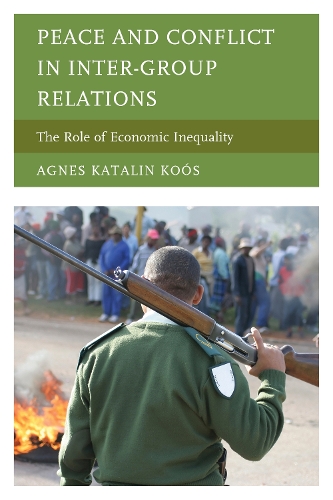
Peace and Conflict in Inter-Group Relations: The Role of Economic Inequality
(Hardback)
Publishing Details
Peace and Conflict in Inter-Group Relations: The Role of Economic Inequality
By (Author) Agnes Katalin Kos
Bloomsbury Publishing PLC
Lexington Books
18th November 2014
United States
Classifications
Professional and Scholarly
Non Fiction
Comparative politics
Peace studies and conflict resolution
Central / national / federal government policies
327
Physical Properties
Hardback
360
Width 162mm, Height 234mm, Spine 30mm
644g
Description
The book ventures into the explanation of intra-state communal conflict, more narrowly of the conflict between majority and minority communal groups, and develops arguments that highlight the causal impact of intergroup economic inequality. Its quest for empirical support has led to the compilation of three large, inter-related datasets, typifying the condition of minorities worldwide. They are mainly based on the Ethnic Power Relations, Minorities at Risk, and Quality of Government data, yet also involve information from a multitude of other sources, such as national statistics, cross-national demographic surveys, and the World Directory of Minorities and Indigenous Peoples. The group-level data, featuring 860 communal groups, show that an impressive forty-five percent of the worlds population do not belong to the majority communal group in their country. As reasonably feared, minorities are in general politically less empowered than their pluralities, and also poorer. Results from multivariate regression analysis corroborate the deleterious impact of horizontal economic inequality on inter-group hostility, measured either as group grievance or violent conflict. The double measurement substantiates the intuition that not all low-to-medium strength hostility is doomed to develop into violent conflict. In fortunate conditions, intergroup disputes can be solved, or compromises may be reached without turning to violence. Part of the analytical efforts have been directed towards detecting the differences between the causes of communal and non-communal social conflicts; and also towards deciphering which institutional conditions aggravate and which mitigate communal conflicts. A large number of variables in the regression models attempt to operationalize constellations that influence the evolution of conflicts either toward peaceful solutions or toward armed collision. The policy implications of the findings are not trivial. Positive discrimination, which in the United States is known as Affirmative Action, is often resisted by denying the unfortunate facts that make it necessary. In addition, currently the policies recommended for heterogeneous societies are also fiercely debated between advocates of power-sharing arrangements and those who would like to facilitate the communal homogenization of each state. This latter type of constitutional engineering is at variance with the political empowerment of minorities, a measure that could alleviate tensions rooted in economic disadvantages.
Reviews
This book is a timely addition to the academic literature, particularly given ongoing discussions linked to the Post 2015 Sustainable Development Goals on tackling inequality and discrimination against minorities and indigenous peoples. Establishing a clear link between economic inequality between groups and the risk of conflict is very important in international debates. This book helps build the case for attention to the rights of minorities which is very much needed. -- Claire Thomas, Deputy Director, Minority Rights Group
Author Bio
Agnes Katalin Kos received her PhD from Simon Fraser University.
